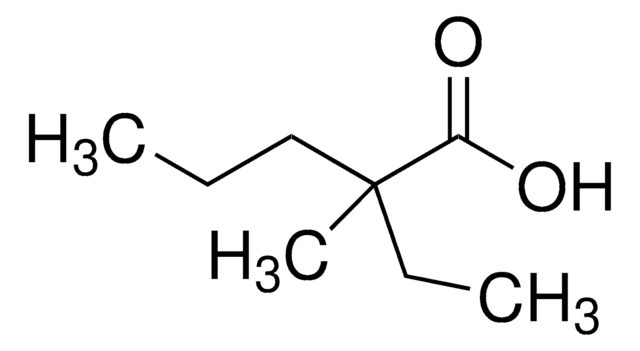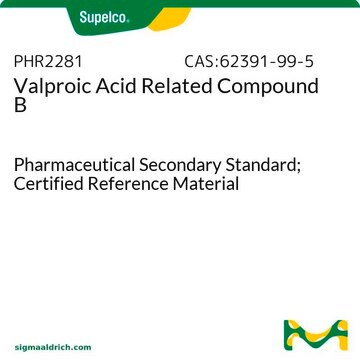Y0001422
Valproic acid for system suitability
European Pharmacopoeia (EP) Reference Standard
Synonym(s):
2-Propylpentanoic acid, Valproic acid
About This Item
Recommended Products
grade
pharmaceutical primary standard
API family
valproic acid
manufacturer/tradename
EDQM
refractive index
n20/D 1.425 (lit.)
bp
220 °C (lit.)
density
0.9 g/mL at 25 °C (lit.)
application(s)
pharmaceutical (small molecule)
format
neat
storage temp.
2-8°C
SMILES string
CCCC(C(O)=O)CCC
InChI
1S/C8H16O2/c1-3-5-7(6-4-2)8(9)10/h7H,3-6H2,1-2H3,(H,9,10)
InChI key
NIJJYAXOARWZEE-UHFFFAOYSA-N
Gene Information
human ... ALDH5A1(7915)
Looking for similar products? Visit Product Comparison Guide
General description
Application
Biochem/physiol Actions
Packaging
Other Notes
Signal Word
Danger
Hazard Statements
Precautionary Statements
Hazard Classifications
Acute Tox. 4 Oral - Eye Dam. 1 - Repr. 1A - Skin Irrit. 2
Storage Class Code
6.1C - Combustible acute toxic Cat.3 / toxic compounds or compounds which causing chronic effects
WGK
WGK 3
Flash Point(F)
231.8 °F - closed cup
Flash Point(C)
111 °C - closed cup
Choose from one of the most recent versions:
Certificates of Analysis (COA)
Sorry, we don't have COAs for this product available online at this time.
If you need assistance, please contact Customer Support.
Already Own This Product?
Find documentation for the products that you have recently purchased in the Document Library.
Customers Also Viewed
Our team of scientists has experience in all areas of research including Life Science, Material Science, Chemical Synthesis, Chromatography, Analytical and many others.
Contact Technical Service








